初中英语中考一轮复习 情态动词 课件
图片预览
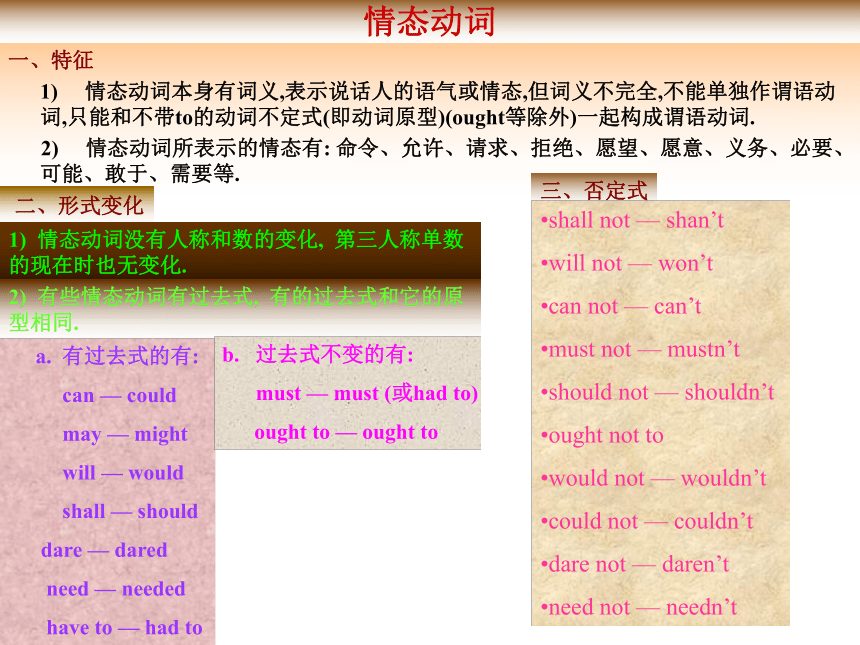
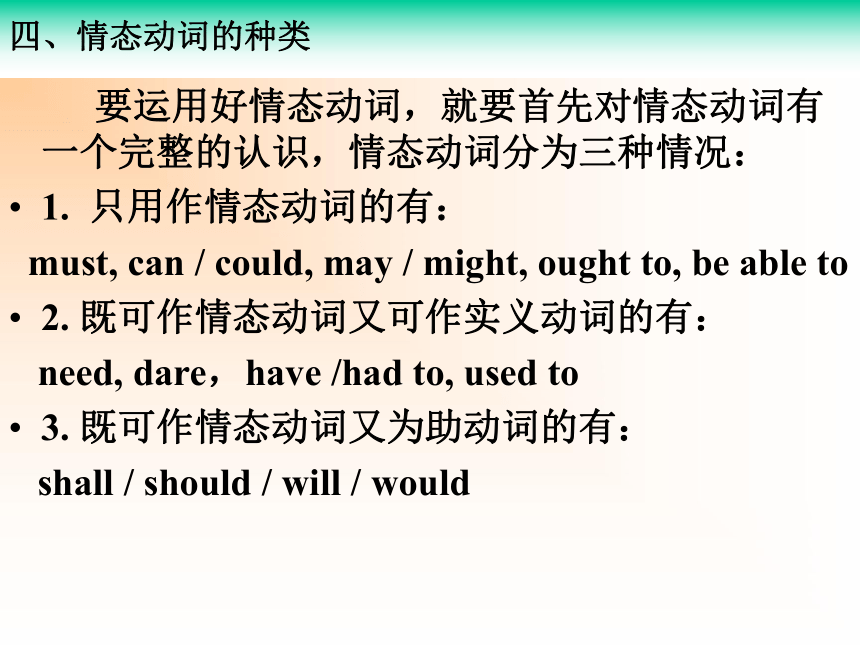
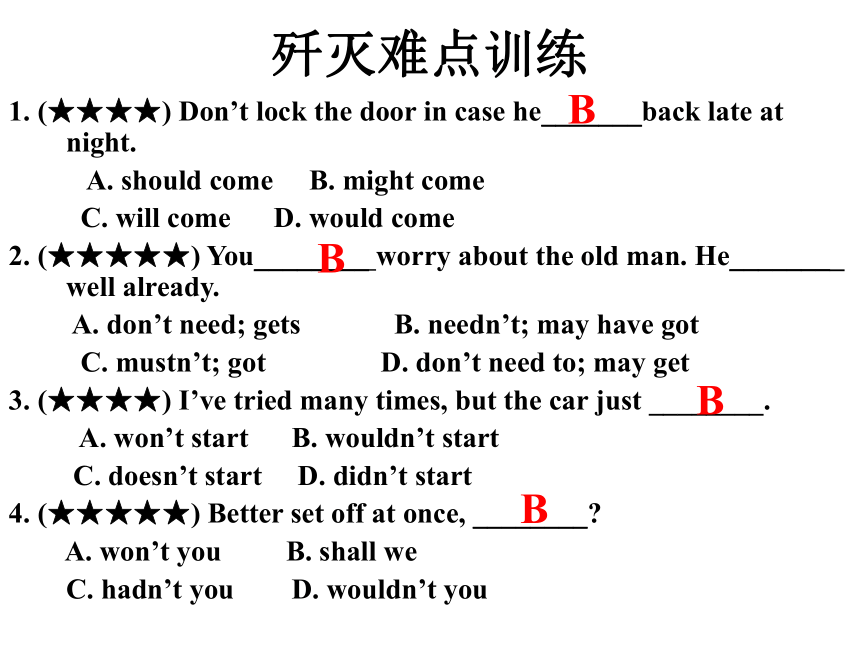

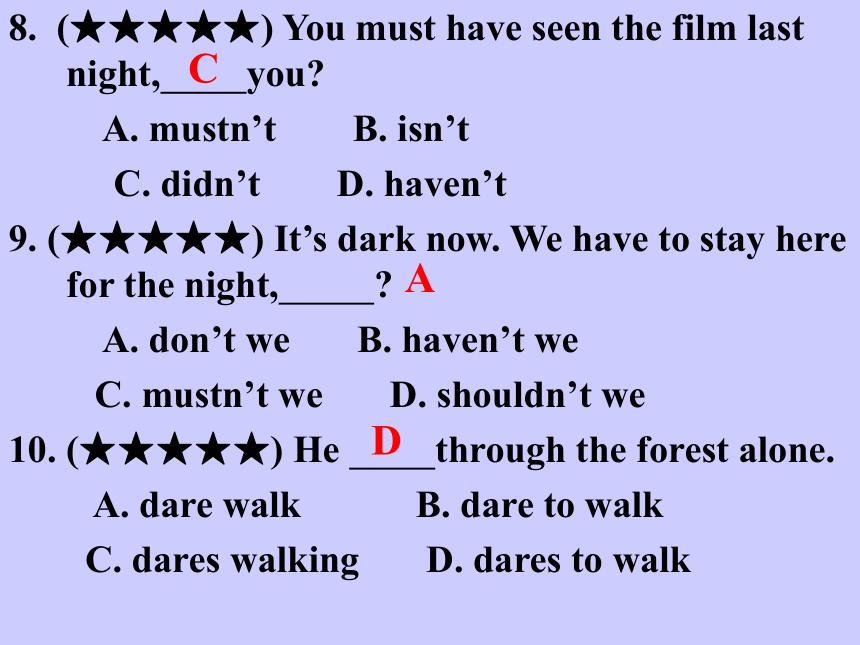

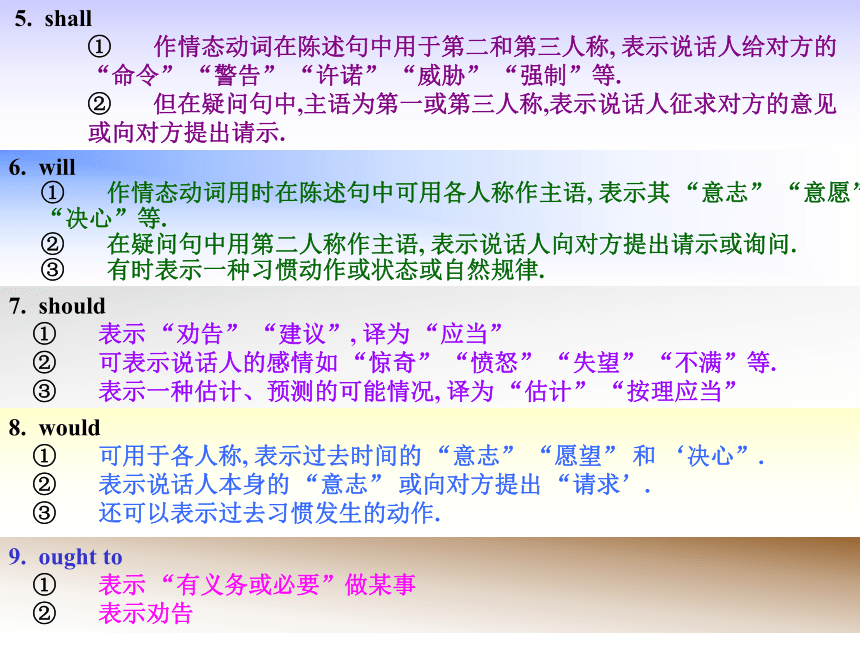
文档简介
(共18张PPT)
情态动词
一、特征
1) 情态动词本身有词义,表示说话人的语气或情态,但词义不完全,不能单独作谓语动 词,只能和不带to的动词不定式(即动词原型)(ought等除外)一起构成谓语动词.
2) 情态动词所表示的情态有: 命令、允许、请求、拒绝、愿望、愿意、义务、必要、可能、敢于、需要等.
二、形式变化
1) 情态动词没有人称和数的变化, 第三人称单数 的现在时也无变化.
2) 有些情态动词有过去式, 有的过去式和它的原型相同.
a. 有过去式的有:
can — could
may — might
will — would
shall — should
dare — dared
need — needed
have to — had to
b. 过去式不变的有:
must — must (或had to)
ought to — ought to
三、否定式
shall not — shan’t
will not — won’t
can not — can’t
must not — mustn’t
should not — shouldn’t
ought not to
would not — wouldn’t
could not — couldn’t
dare not — daren’t
need not — needn’t
四、情态动词的种类
要运用好情态动词,就要首先对情态动词有一个完整的认识,情态动词分为三种情况:
1. 只用作情态动词的有:
must, can / could, may / might, ought to, be able to
2. 既可作情态动词又可作实义动词的有:
need, dare,have /had to, used to
3. 既可作情态动词又为助动词的有:
shall / should / will / would
歼灭难点训练
1. (★★★★) Don’t lock the door in case he_______back late at night.
A. should come B. might come
C. will come D. would come
2. (★★★★★) You________ worry about the old man. He________ well already.
A. don’t need; gets B. needn’t; may have got
C. mustn’t; got D. don’t need to; may get
3. (★★★★) I’ve tried many times, but the car just ________.
A. won’t start B. wouldn’t start
C. doesn’t start D. didn’t start
4. (★★★★★) Better set off at once, ________
A. won’t you B. shall we
C. hadn’t you D. wouldn’t you
B
B
B
B
5. (★★★★★) I was really anxious about. You ________ home without a word. (2001年高考)
A. mustn’t leave B. shouldn’t have left
C. couldn’t have left D. needn’t leave
6. (★★★★★) —Are you coming to Jeff’s party
—I’m not sure. I go to the concert instead. (2000年高考)
A. must B. would C. should D. might
7. (★★★★★) —Do you think he will do me a favour
—As far as I know, he is the last one to help others.
He be prepared to give you a hand, though. (南京二模)
A. might B. must C. can D. should
B
D
B
8. (★★★★★) You must have seen the film last night, you
A. mustn’t B. isn’t
C. didn’t D. haven’t
9. (★★★★★) It’s dark now. We have to stay here for the night,
A. don’t we B. haven’t we
C. mustn’t we D. shouldn’t we
10. (★★★★★) He through the forest alone.
A. dare walk B. dare to walk
C. dares walking D. dares to walk
C
A
D
五、情态动词的词义及基本用法
1. can, could
① 表示体力或脑力方面的 “能力”,或根据客观条件能做某种动作的 “能力”.
② 用于否定句或疑问句中表示说话人.对发生的事情的 “怀疑” “猜测” “不肯定”的语气.
③ could比can 语气更弱.
④ can 不用于肯定句(除非是经验谈).
2. may, might
① may 表示 “允许” 或 “请求”. 在口语中可用can替代,但may比较正式.
② 表示说话人的猜测,认为某一事情 “或许” 或 “可能” 发生.用might指现 在的时候语气较为委婉客气或更加不肯定, might 还可表示 “规劝”.
3. must
①表示 “必须” 或 “应当”. 其否定式表示 ‘不应该” 或 “不许可”, 语气比较 强烈.
② 表示说话人对事物的推测, 意思为 “一定” 或 “准是”, 语气比may要强得多
4. have to
① 表示 “不得不” “必须” 的概念, 比must更含有 “客观条件使得必须如此做”, 并有较多的时态.
5. shall
① 作情态动词在陈述句中用于第二和第三人称, 表示说话人给对方的 “命令” “警告” “许诺” “威胁” “强制”等.
② 但在疑问句中,主语为第一或第三人称,表示说话人征求对方的意见或向对方提出请示.
6. will ① 作情态动词用时在陈述句中可用各人称作主语, 表示其 “意志” “意愿” “决心”等. ② 在疑问句中用第二人称作主语, 表示说话人向对方提出请示或询问. ③ 有时表示一种习惯动作或状态或自然规律.
7. should ① 表示 “劝告” “建议”, 译为 “应当” ② 可表示说话人的感情如 “惊奇” “愤怒” “失望” “不满”等. ③ 表示一种估计、预测的可能情况, 译为 “估计” “按理应当”
8. would ① 可用于各人称, 表示过去时间的 “意志” “愿望” 和 ‘决心”. ② 表示说话人本身的 “意志” 或向对方提出 “请求’. ③ 还可以表示过去习惯发生的动作.
9. ought to ① 表示 “有义务或必要”做某事 ② 表示劝告
六、在疑问句中的用法
情态动词在疑问句中的用法和助动词相同,但可在不同的表达方式中表达不同的情态.如:
May I ask you a question
Can you lend me your dictionary for a minute
May I come in Yes, do.
May I take this book out of the reading-room No, you mustn’t.
Must I return it today No, you needn’t. You may return it tomorrow.
May you have a pleasant journey.
做题时不仅要熟练掌握情态动词的基本用法,更要结合上下文仔细体会文句中所隐含的语气或情感。
情态动词在近年来的高考试题中的难度日渐加大,不仅是由于情态动词表示说话人的语气和心态等,而且这些往往是需用心体会而得的。由于语气的暗示在题目中变得更隐蔽,语气的变化更微妙,因而更综合化了。
七、表示猜测的情态动词用法
表示猜测是情态动词的重要用法之一。Can, could, may, might, will, would, should, ought to, must是常用的表示猜测的情态动词。
1.常用句式和意义
could
may
might
would
should
ought to
will
must
+
动词原型
现在 / 将来可能……
想必现在 / 过去……; 或
现在 / 过去可能…..
表
示
将来一定 / 准会……
现在 / 将来会……
现在 / 将来一定 / 肯定……
1) 现在或将来
have V-ed
could
may
might
would
should
ought to
must
本来可能做,但未做
过去一定 / 肯定做……
+
表
示
过去
应该做,但未做
愿意做,但没做
虚
假
语
气
could
can
need
should
ought to
一定没有做
+
not have V-ed
没有必要干某事,但多余的干了
表示过去
不应该做某事,但做了
虚
假
语
气
现在
could
may
might
must
现在一定正在……
+
be V-ing
表
示
可能正在……
2. 需要注意的几点问题
1) 表示猜测,can一般不用于肯定句中,除非是“经验之谈”。我们在SEFC Book2, Lesson 30中学过这样两个表示“经验之谈”的句子:
Children can often get ill suddenly. (小孩常常可能突然生病。)
Certain things in the home can be dangerous, especially if you have young children. (家里的某些东西可能有危险,尤其是有小孩的时候。)
上面两句可以看作医务工作者或抚养过孩子的人说的话,属“经验之谈”。
2) may 和might都不用于疑问句中。如:
(正) Can / Could it be cloudy tomorrow
(误) May / Might it be cloudy tomorrow
3)must 的否定式是can’t / couldn’t ,不是needn’t 或mustn’t
解答情态动词表示猜测的试题时,一要清楚被猜测的时间,二要清楚有无客观事实根据。若有客观事实根据,则无论是肯定还是否定的猜测,猜测语气最强且符合时间要求的为最佳答案;情态动词表示猜测时语气从强到弱的顺序是:must, will, would, ought to, should, can, may, could, might。若无客观事实根据,纯凭主观臆断,则猜测语气最弱且符合时间要求的为最佳答案。
习题
1. I didn’t hear the phone I________ asleep.
A. must be B. must have been C. should be D. should have been
2. We last night, but we went to the concert instead.
A. must have studied B. might study
C. should have studied D. would study
B
3. John, you play with the knife, you _hurt yourself.
A. won’t; can’t B. mustn’t; may
C. shouldn’t; must D. can’t; shouldn’t
C
4. It’s nearly seven o’clock. Jack_ _be here at any moment.
A. must B. need C. should D. can
B
B
5. She for what she has done, but why do you keep silent on it
A. ought to praise B. ought to have praised
C. ought to be praised D. ought to have been praised
C
C
7. —Shall I call a doctor for you — ________. I will be better soon. A. Yes, you may B. No, you mustn’t C. No, you needn’t D. I’d rather not
6. If your boss is not right, you him.
A. mustn’t obey B. don’t have to obey
C. wouldn’t have obey D. can’t have obey
B
8. —Would you like to go shopping with me tonight —________. A. I’d love so B. I’ll like to C. I would like that D. I’d love to
D
9. He______ you more help, even though he was very busy. A. might have given B. might
C. may have given D. may give
D
10. Noise________ harmful in China. A. didn’t use to be considered B. usedn’t to consider
C. didn’t use to consider D. isn’t used to be considered
A
A
区别微妙的情态动词
情态动词在近年来的高考试题中的难度日渐加大,不仅是由于情态动词表示说话人的语气和心态等,而且这些往往是需用心体会而得的。由于语气的暗示在题目中变得更隐蔽,语气的变化更微妙,因而更综合化了。
案例探究
1. —Will you stay for lunch
—Sorry, _____. My brother is coming to see me.
A. I mustn’t B.I can’t
C. I needn’t D.I won’t
命题意图:考查情态动词在一般疑问句答语中的用法。本题属四星级题。
知识依托:mustn’t 不允许、禁止
can’t客观上不能办到
needn’t不需要
won’t不会,不愿意
2. Sorry I’m late. I________ have turned off the alarm clock and gone back to sleep again. (2000年春季高考北京)
A. might B. should C. can D. will
命题意图:本题考查对过去猜测的用法。属五星级题。
知识依托:may / might / must + have done表示对过去的肯定猜测。
can’t / couldn’t + have done表示对过去的否定猜测。
情态动词
一、特征
1) 情态动词本身有词义,表示说话人的语气或情态,但词义不完全,不能单独作谓语动 词,只能和不带to的动词不定式(即动词原型)(ought等除外)一起构成谓语动词.
2) 情态动词所表示的情态有: 命令、允许、请求、拒绝、愿望、愿意、义务、必要、可能、敢于、需要等.
二、形式变化
1) 情态动词没有人称和数的变化, 第三人称单数 的现在时也无变化.
2) 有些情态动词有过去式, 有的过去式和它的原型相同.
a. 有过去式的有:
can — could
may — might
will — would
shall — should
dare — dared
need — needed
have to — had to
b. 过去式不变的有:
must — must (或had to)
ought to — ought to
三、否定式
shall not — shan’t
will not — won’t
can not — can’t
must not — mustn’t
should not — shouldn’t
ought not to
would not — wouldn’t
could not — couldn’t
dare not — daren’t
need not — needn’t
四、情态动词的种类
要运用好情态动词,就要首先对情态动词有一个完整的认识,情态动词分为三种情况:
1. 只用作情态动词的有:
must, can / could, may / might, ought to, be able to
2. 既可作情态动词又可作实义动词的有:
need, dare,have /had to, used to
3. 既可作情态动词又为助动词的有:
shall / should / will / would
歼灭难点训练
1. (★★★★) Don’t lock the door in case he_______back late at night.
A. should come B. might come
C. will come D. would come
2. (★★★★★) You________ worry about the old man. He________ well already.
A. don’t need; gets B. needn’t; may have got
C. mustn’t; got D. don’t need to; may get
3. (★★★★) I’ve tried many times, but the car just ________.
A. won’t start B. wouldn’t start
C. doesn’t start D. didn’t start
4. (★★★★★) Better set off at once, ________
A. won’t you B. shall we
C. hadn’t you D. wouldn’t you
B
B
B
B
5. (★★★★★) I was really anxious about. You ________ home without a word. (2001年高考)
A. mustn’t leave B. shouldn’t have left
C. couldn’t have left D. needn’t leave
6. (★★★★★) —Are you coming to Jeff’s party
—I’m not sure. I go to the concert instead. (2000年高考)
A. must B. would C. should D. might
7. (★★★★★) —Do you think he will do me a favour
—As far as I know, he is the last one to help others.
He be prepared to give you a hand, though. (南京二模)
A. might B. must C. can D. should
B
D
B
8. (★★★★★) You must have seen the film last night, you
A. mustn’t B. isn’t
C. didn’t D. haven’t
9. (★★★★★) It’s dark now. We have to stay here for the night,
A. don’t we B. haven’t we
C. mustn’t we D. shouldn’t we
10. (★★★★★) He through the forest alone.
A. dare walk B. dare to walk
C. dares walking D. dares to walk
C
A
D
五、情态动词的词义及基本用法
1. can, could
① 表示体力或脑力方面的 “能力”,或根据客观条件能做某种动作的 “能力”.
② 用于否定句或疑问句中表示说话人.对发生的事情的 “怀疑” “猜测” “不肯定”的语气.
③ could比can 语气更弱.
④ can 不用于肯定句(除非是经验谈).
2. may, might
① may 表示 “允许” 或 “请求”. 在口语中可用can替代,但may比较正式.
② 表示说话人的猜测,认为某一事情 “或许” 或 “可能” 发生.用might指现 在的时候语气较为委婉客气或更加不肯定, might 还可表示 “规劝”.
3. must
①表示 “必须” 或 “应当”. 其否定式表示 ‘不应该” 或 “不许可”, 语气比较 强烈.
② 表示说话人对事物的推测, 意思为 “一定” 或 “准是”, 语气比may要强得多
4. have to
① 表示 “不得不” “必须” 的概念, 比must更含有 “客观条件使得必须如此做”, 并有较多的时态.
5. shall
① 作情态动词在陈述句中用于第二和第三人称, 表示说话人给对方的 “命令” “警告” “许诺” “威胁” “强制”等.
② 但在疑问句中,主语为第一或第三人称,表示说话人征求对方的意见或向对方提出请示.
6. will ① 作情态动词用时在陈述句中可用各人称作主语, 表示其 “意志” “意愿” “决心”等. ② 在疑问句中用第二人称作主语, 表示说话人向对方提出请示或询问. ③ 有时表示一种习惯动作或状态或自然规律.
7. should ① 表示 “劝告” “建议”, 译为 “应当” ② 可表示说话人的感情如 “惊奇” “愤怒” “失望” “不满”等. ③ 表示一种估计、预测的可能情况, 译为 “估计” “按理应当”
8. would ① 可用于各人称, 表示过去时间的 “意志” “愿望” 和 ‘决心”. ② 表示说话人本身的 “意志” 或向对方提出 “请求’. ③ 还可以表示过去习惯发生的动作.
9. ought to ① 表示 “有义务或必要”做某事 ② 表示劝告
六、在疑问句中的用法
情态动词在疑问句中的用法和助动词相同,但可在不同的表达方式中表达不同的情态.如:
May I ask you a question
Can you lend me your dictionary for a minute
May I come in Yes, do.
May I take this book out of the reading-room No, you mustn’t.
Must I return it today No, you needn’t. You may return it tomorrow.
May you have a pleasant journey.
做题时不仅要熟练掌握情态动词的基本用法,更要结合上下文仔细体会文句中所隐含的语气或情感。
情态动词在近年来的高考试题中的难度日渐加大,不仅是由于情态动词表示说话人的语气和心态等,而且这些往往是需用心体会而得的。由于语气的暗示在题目中变得更隐蔽,语气的变化更微妙,因而更综合化了。
七、表示猜测的情态动词用法
表示猜测是情态动词的重要用法之一。Can, could, may, might, will, would, should, ought to, must是常用的表示猜测的情态动词。
1.常用句式和意义
could
may
might
would
should
ought to
will
must
+
动词原型
现在 / 将来可能……
想必现在 / 过去……; 或
现在 / 过去可能…..
表
示
将来一定 / 准会……
现在 / 将来会……
现在 / 将来一定 / 肯定……
1) 现在或将来
have V-ed
could
may
might
would
should
ought to
must
本来可能做,但未做
过去一定 / 肯定做……
+
表
示
过去
应该做,但未做
愿意做,但没做
虚
假
语
气
could
can
need
should
ought to
一定没有做
+
not have V-ed
没有必要干某事,但多余的干了
表示过去
不应该做某事,但做了
虚
假
语
气
现在
could
may
might
must
现在一定正在……
+
be V-ing
表
示
可能正在……
2. 需要注意的几点问题
1) 表示猜测,can一般不用于肯定句中,除非是“经验之谈”。我们在SEFC Book2, Lesson 30中学过这样两个表示“经验之谈”的句子:
Children can often get ill suddenly. (小孩常常可能突然生病。)
Certain things in the home can be dangerous, especially if you have young children. (家里的某些东西可能有危险,尤其是有小孩的时候。)
上面两句可以看作医务工作者或抚养过孩子的人说的话,属“经验之谈”。
2) may 和might都不用于疑问句中。如:
(正) Can / Could it be cloudy tomorrow
(误) May / Might it be cloudy tomorrow
3)must 的否定式是can’t / couldn’t ,不是needn’t 或mustn’t
解答情态动词表示猜测的试题时,一要清楚被猜测的时间,二要清楚有无客观事实根据。若有客观事实根据,则无论是肯定还是否定的猜测,猜测语气最强且符合时间要求的为最佳答案;情态动词表示猜测时语气从强到弱的顺序是:must, will, would, ought to, should, can, may, could, might。若无客观事实根据,纯凭主观臆断,则猜测语气最弱且符合时间要求的为最佳答案。
习题
1. I didn’t hear the phone I________ asleep.
A. must be B. must have been C. should be D. should have been
2. We last night, but we went to the concert instead.
A. must have studied B. might study
C. should have studied D. would study
B
3. John, you play with the knife, you _hurt yourself.
A. won’t; can’t B. mustn’t; may
C. shouldn’t; must D. can’t; shouldn’t
C
4. It’s nearly seven o’clock. Jack_ _be here at any moment.
A. must B. need C. should D. can
B
B
5. She for what she has done, but why do you keep silent on it
A. ought to praise B. ought to have praised
C. ought to be praised D. ought to have been praised
C
C
7. —Shall I call a doctor for you — ________. I will be better soon. A. Yes, you may B. No, you mustn’t C. No, you needn’t D. I’d rather not
6. If your boss is not right, you him.
A. mustn’t obey B. don’t have to obey
C. wouldn’t have obey D. can’t have obey
B
8. —Would you like to go shopping with me tonight —________. A. I’d love so B. I’ll like to C. I would like that D. I’d love to
D
9. He______ you more help, even though he was very busy. A. might have given B. might
C. may have given D. may give
D
10. Noise________ harmful in China. A. didn’t use to be considered B. usedn’t to consider
C. didn’t use to consider D. isn’t used to be considered
A
A
区别微妙的情态动词
情态动词在近年来的高考试题中的难度日渐加大,不仅是由于情态动词表示说话人的语气和心态等,而且这些往往是需用心体会而得的。由于语气的暗示在题目中变得更隐蔽,语气的变化更微妙,因而更综合化了。
案例探究
1. —Will you stay for lunch
—Sorry, _____. My brother is coming to see me.
A. I mustn’t B.I can’t
C. I needn’t D.I won’t
命题意图:考查情态动词在一般疑问句答语中的用法。本题属四星级题。
知识依托:mustn’t 不允许、禁止
can’t客观上不能办到
needn’t不需要
won’t不会,不愿意
2. Sorry I’m late. I________ have turned off the alarm clock and gone back to sleep again. (2000年春季高考北京)
A. might B. should C. can D. will
命题意图:本题考查对过去猜测的用法。属五星级题。
知识依托:may / might / must + have done表示对过去的肯定猜测。
can’t / couldn’t + have done表示对过去的否定猜测。
同课章节目录
- 词法
- 名词
- 动词和动词短语
- 动词语态
- 动词时态
- 助动词和情态动词
- 非谓语动词
- 冠词
- 代词
- 数词和量词
- 形容词副词及其比较等级
- 介词和介词短语
- 连词和感叹词
- 构词法
- 相似、相近词比较
- 句法
- 陈述句
- 一般疑问句和否定疑问句
- 特殊疑问句及选择疑问句
- 反意疑问句
- 存在句(There be句型)
- 宾语从句
- 定语从句
- 状语从句
- 主谓一致问题
- 简单句
- 并列句
- 复合句
- 主谓一致
- 主、表语从句
- 名词性从句
- 直接引语和间接引语
- 虚拟语气
- 感叹句
- 强调句
- 倒装句
- 祈使句
- 句子的成分
- 句子的分类
- 题型专区
- 单项选择部分
- 易错题
- 完形填空
- 阅读理解
- 词汇练习
- 听说训练
- 句型转换
- 补全对话
- 短文改错
- 翻译
- 书面表达
- 任务型阅读
- 语法填空
- 其他资料
